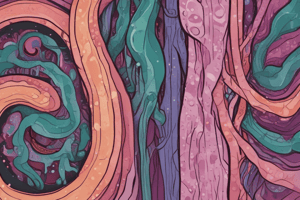Podcast
Questions and Answers
What is a common reason for considering colectomy in patients with ulcerative colitis (UC)?
What is a common reason for considering colectomy in patients with ulcerative colitis (UC)?
- To reduce symptoms without surgery
- To prevent the recurrence of Crohn disease
- To act as a prophylactic measure against colorectal cancer (correct)
- To improve quality of life immediately
What should patients receiving sulfasalazine also take to counteract its side effects?
What should patients receiving sulfasalazine also take to counteract its side effects?
- Vitamin C
- Calcium tablets
- Iron supplements
- Oral folic acid (correct)
Which scale is commonly used to evaluate Crohn's disease in clinical trials?
Which scale is commonly used to evaluate Crohn's disease in clinical trials?
- Crohn Disease Activity Index (correct)
- Ulcerative Colitis Quality of Life Index
- Stool Frequency Assessment Tool
- Inflammatory Bowel Disease Severity Score
What is one of the elements included in standardized assessment scales for ulcerative colitis?
What is one of the elements included in standardized assessment scales for ulcerative colitis?
Why is surgery more often reserved for complications in Crohn's disease compared to ulcerative colitis?
Why is surgery more often reserved for complications in Crohn's disease compared to ulcerative colitis?
What is the main characteristic of ulcerative colitis (UC)?
What is the main characteristic of ulcerative colitis (UC)?
Which diagnostic procedure is key for investigating inflammatory bowel disease (IBD)?
Which diagnostic procedure is key for investigating inflammatory bowel disease (IBD)?
Which of the following is associated with Crohn's disease?
Which of the following is associated with Crohn's disease?
What type of surgical intervention is curative for ulcerative colitis?
What type of surgical intervention is curative for ulcerative colitis?
What is commonly reported in patients with Crohn's disease regarding their nutritional status?
What is commonly reported in patients with Crohn's disease regarding their nutritional status?
Which inflammatory marker is commonly raised in patients with active inflammatory bowel disease?
Which inflammatory marker is commonly raised in patients with active inflammatory bowel disease?
Which pharmacological treatment is specifically used to inhibit tumor necrosis factor-α (TNF-α)?
Which pharmacological treatment is specifically used to inhibit tumor necrosis factor-α (TNF-α)?
What is a limitation of surgical treatment in Crohn's disease?
What is a limitation of surgical treatment in Crohn's disease?
Flashcards are hidden until you start studying
Study Notes
Inflammatory Bowel Disease Overview
- Inflammatory bowel disease (IBD) includes two main types: ulcerative colitis (UC) and Crohn’s disease (CD).
- Ulcerative colitis is a mucosal inflammation limited to the rectum and colon.
- Crohn’s disease involves transmural inflammation and can occur anywhere in the gastrointestinal (GI) tract.
- Both conditions have unknown etiologies but may share a common pathogenic mechanism.
Clinical Presentation
- Ulcerative colitis and Crohn’s disease present distinct clinical features but both lead to significant morbidity.
- Symptoms can include abdominal pain, diarrhea, and rectal bleeding.
Diagnosis
- Lower gastrointestinal tract endoscopy (sigmoidoscopy and colonoscopy) is crucial for diagnosis, enabling direct visualization and biopsy of the large bowel.
- CT scans and MRI are optimal imaging techniques for identifying fistulae and abscesses in active Crohn’s disease.
- Increased inflammatory markers (ESR, CRP) and low hemoglobin alongside elevated platelet count suggest active disease.
- Vitamin B12 deficiencies may occur in patients with chronic terminal ileal disease.
- Chronic inflammation and malabsorption can be indicated by low levels of red cell folate, serum albumin, magnesium, calcium, zinc, and essential fatty acids.
- Anti-Saccharomyces cerevisiae antibodies (ASCA) are generally present in Crohn’s disease.
Pharmacologic Treatment
- Major drug therapies for IBD include:
- Aminosalicylates
- Glucocorticoids
- Immunosuppressive agents
- Antimicrobials
- Anti-TNF-α antibodies
- Natalizumab for leukocyte adhesion/migration inhibition.
Surgical Treatment
- Surgical options for ulcerative colitis include colectomy, temporary ileostomy, and ileoanal pouch construction, which are curative.
- Proctocolectomy and permanent ileostomy are also viable, especially for severe cases.
- Crohn's disease does not allow for curative surgery, as recurrence in other gut areas is common.
Non-Pharmacologic Treatment
- Up to 85% of Crohn’s disease patients experience protein-energy malnutrition or suboptimal weight.
- Nutritional needs often managed through enteral supplementation, with probiotics showing mixed results for UC remission.
- Colectomy may be considered in UC patients with longstanding disease (over 8-10 years) or severe dysplasia to prevent colorectal cancer.
Evaluation of Therapeutic Outcomes
- Patients on sulfasalazine require oral folic acid supplementation to counteract inhibition of folic acid absorption.
- Treatment success is assessed through:
- Patient-reported complaints
- Signs and symptoms
- Physician examination and history
- Selected lab tests
- Quality of life measures.
- Disease-rating scales, such as the Crohn Disease Activity Index, are employed for clinical trials.
- Standardized assessment tools for UC include evaluations of stool frequency, presence of blood in stool, mucosal appearance via endoscopy, and physician’s global assessment.
Studying That Suits You
Use AI to generate personalized quizzes and flashcards to suit your learning preferences.




